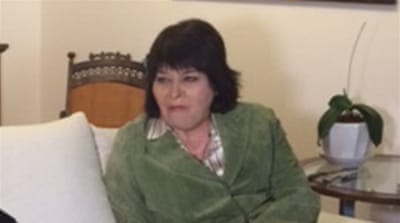Pinochet-era crime comes back to haunt Chile
Woman set ablaze during a 1986 protest has become a symbol of atrocities and impunity under the country’s dictatorship.

Santiago, Chile – Carmen Gloria Quintana has had more than 50 reconstruction and plastic surgery operations, but they have not been enough to turn the clock back.
“The scars on my face and burn marks all over my body are visible proof of the atrocities I suffered, but there are many thousands more who are suffering,” she says.
Keep reading
list of 4 itemsPalestinian Prisoner’s Day: How many are still in Israeli detention?
‘Mama we’re dying’: Only able to hear her kids in Gaza in their final days
Europe pledges to boost aid to Sudan on unwelcome war anniversary
Quintana is the survivor of one of the most horrendous human rights violations committed during Chile’s 17-year military dictatorship. Thousands of others were arrested and never found again.
But this week, it is Quintana’s story that has unleashed a national outcry about a so-called “pact of silence” within the army to cover up its crimes.
Quintana was an 18-year-old university student on July 2, 1986, when she and Rodrigo Rojas, a 19-year-old photographer, were chased down by three military patrols during a protest in Santiago. First they were beaten. Then an officer doused them with petrol and set them ablaze. Afterwards, they were tossed onto a truck, their bodies dumped into a ditch 20km away and left to die.
But miraculously they were found and taken to hospital, where after agonising for four days, Rojas died. His last words were: “The military burned me alive.”
Although disfigured from burns to 67 percent of her body, Quintana survived to denounce the crime, becoming a symbol not just of the Pinochet dictatorship’s atrocities, but also of impunity.
Scores of witnesses were threatened, imprisoned and in at least one case forced into exile. Eventually one officer was found guilty of “negligence” and served a few months in prison.
Conscript’s testimony
Twenty-nine years later, the case has come back to haunt Chile’s Armed Forces and the civilians who allegedly helped cover up the crime.
Fernando Guzman, a former conscript who belonged to one of the three patrols, has come forward and identified the servicemen and officers involved in the attack. He has also revealed what human rights advocates have long alleged.

“There has been a pact of silence in the army. I was paid by the military, but I had to keep my mouth shut,” he says. “We were drilled and rehearsed by two well-known civilian lawyers on what to say to investigators. We were constantly reminded that we had to take care of our family.”
Guzman says he could not live with the guilt any longer. His unprecedented testimony, and that of another conscript who this week followed his lead, have given fresh ammunition to a special prosecutor reinvestigating the murder and attempted murder case of “The Quemados”, or “The Burned Ones”.
Thirteen former soldiers and officers have been arrested, including retired Lieutenant Julio Castaner, who until last week was still working as an adviser to the army in the Patagonian city of Punta Arenas. He is accused of having given the order and actually setting the teenagers on fire.
Quintana – today a psychologist who is living in Canada with her husband and three daughters – has returned to Chile to expand on the lawsuit presented by Rojas’ mother, Veronica De Negri. She is demanding that both civilian and military personnel who planned, executed or covered up the crime, be brought to justice. But most importantly, she wants the state to force the army to end its pact of silence.
New push for justice
“It is cruel and inhumane, especially for the families of the missing who are old and may die without ever finding the remains of their loved one,” Quintana told me. “I demand that the civilian powers and the president give the army a deadline to reveal the truth and bring those responsible of rights violations before the courts. This cannot continue. Enough of this silence!”
Quintana also told me that this week she agreed to meet the former conscript who had witnessed her burning and revealed the details.
“Guzman asked for my forgiveness. Meeting him was very difficult, but what he did was very important and I am grateful because it has given a new push not only to our case but also to other unsolved ones,” she says.
Rojas’ mother, who also met Guzman, says she cannot forgive him, but she believes that he too was a victim who was forced to lie.
“My dream is that there will be more former soldiers like Guzman who will break the pact of silence, people who feel so miserable that they realise that it’s better to speak the truth, so that they can be liberated.”